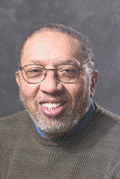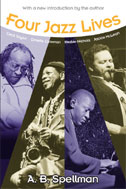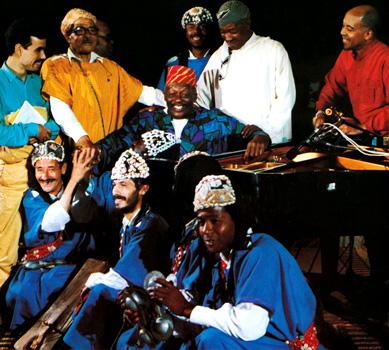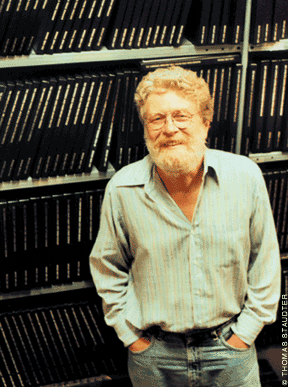A brief conversation with A.B. SPELLMAN… the first in a series with African-American writers who chronicle serious music…
Despite the historic origins of this music called jazz, a unique development of the African experience in America, the ranks of black critics and journalists covering the music has always been thin. Black jazz writers have been inspired through the years by the examples of Ralph Ellison, Amiri Baraka (formerly LeRoi Jones), Albert Murray, more recently Stanley Crouch… and few others. The Jazz Journalists Association has a handful of currently active black writers on its roles. Major jazz festivals such as Montreal, Monterey, Northsea, and Umbria, which have long been annual congress for jazz writers who generally operate pretty much in splendid isolation, rarely find more than one black writer in the coverage pool.
Your correspondent has been writing about the music from various perspectives since my undergrad years in the early 70s at Kent State University. In that time I’ve been privileged to have numerous off-the-record conversations with artists who have often questioned why there are so few black jazz writers. In that spirt we begin a series of conversations posing the same set of questions to black jazz writers on how they got started and their perspective as members of a tiny subset of the fraternity of jazz writers.
Our series begins with one of the veterans who several of the forthcoming participants in this series have cited as one of their inspirations, writer-poet A.B. Spellman, namesake of the NEA Jazz Masters (see the 2010 recipients announcement in these pages) annual fellowship for non-performing jazz advocates, and retired longtime program director at the National Endowment for the Arts. Spellman’s most indelible jazz writing contribution is the valuable and unique book originally titled Four Lives in the Bebop Business, reissued by University of Michigan Press as Four Jazz Lives. A.B. is also the proud father of a past artist interview participant in The Independent Ear, oboist Toyin Spellman of the visionary young chamber ensemble Imani Winds. This is the first in an anticipated bi-weekly series. Stay tuned…

A.B. Spellman
What motivated you to write about serious music in the first place?
The simple answer is that I discovered that I could write about music and I had the opportunity. LeRoi Jones introduced me to Dan Morgenstern, who was then the editor of Downbeat [circa 1960s], and he let me write an Introducing Archie Shepp piece and then made me a regular reviewer. A new and stronger motivation set in with the so-called "New Thing", which was resisted mightily by the critics who had defended bebop. I’d leave the Jazz Gallery or the Vanguard limp in the knees after having ‘Trane blow my sinuses out only to read in Downbeat how unmusical, even destructive of jazz he was playing, and I could only conclude that either I was tone deaf or those cats were, and I trusted my ear. So I wrote in self-defense. I wrote one line in particular that was quoted often "What does anti-jazz mean and who are these ofays who’ve declared themselves the guardians of last year’s blues."
I stopped [writing about jazz] because I was frustrated by my limitations. I didn’t know enough music to do the kind of technical analysis that I thought was needed. What I was writing seemed to me to be at best journalism, at worst fan mail, so I cut it loose and hoped that some other brothers would step in.
When you started on this quest were you aware of the dearth of African Americans writing about jazz?
Of course. There was me, LeRoi (not yet Baraka), some belles-lettres pieces of Ralph Ellison’s and Al Murray’s, and not much else.

Why do you suppose that’s still such a glaring disparity — where you have a significant number of black musicians making serious music but so few black media commentators on that music?
I’m not sure. There are people who are competent to write sound criticism in the colleges and universities — I’m thinking about folk like those who publish in the Journal of Black Music — but they stick in the academies. There are more conservatory trained African-Americans now than there ever have been, but they don’t write. Jazz musicians don’t write much either, and they should. I was very impressed with George Lewis’ A Power Stronger Than Itself [see our review in The Independent Ear], about the AACM, a book with true depth and scope. He didn’t leave it to some outsider to write that history, to his great credit.
Do you think that disparity or dearth of African American writers contributes to how the music is covered, including why some musicians may be elevated over others and whether that has anything to do with the lack of cultural diversity among the jazz writer fraternity?
It certainly does. This is not to slam the many good white authors who have written about the music; without them there’d be very little documentation at all. But damn! This is music that came out of us; this is our synthesis and exposition of our American urban presence, but except for some extremely valuable autobiographies, for the most part intermediated by whites, the people who have lived closest to the experiences of the major makers [of jazz] have been silent. The opportunity is diminishing as the potential inventory of African-American critics is rising, as the black domination in jazz is declining with each generation, for the jazz training opportunities for school-aged whites by far exceeds those for blacks.
Do you ever get the sense that the way and tone of how serious music is covered has anything to do with who’s covering it?
All art criticism is subjective, no matter how objective connoisseurs pretend to be. Put another way, criticism is essentially the defense of taste, and taste is a cop and blow proposition, as we used to say. A diversity of writers would make for a diversity of opinions, which would give readers choices, which would affect the roster of success.
What’s your sense of the indifference of so many African-American oriented publications towards serious music, despite the fact that many African-Americans continue to create serious music?
The answer is obvious: the African-American commercial press is out to make money like the rest of the commercial press, and the money is with popular culture. The not-for-profit black press is small and poorly subscribed. That’s our fault for not supporting it.
In your experience writing about serious music what have been some of your most rewarding encounters?
Nothng compares with experiencing John Coltrane live. I’ve written about this so much tht I’m reluctant to go over it again. I would also add the following names: Lucky Thompson, Sonny Clark, Fats Navarro, Hassan Ibn Ali, Wynton Kelly, Tina Brooks, Martial Solal… I’ll try not to wake up with more names on my mind.
As a summation of what the music has meant to him A.B. Spellman granted permission to excerpt two separate passges from his brilliant autobiographical poem The First Sixty:
bebop saved the 40s, a clear wind
blew jazzbo collins into my home
from his nest in the "purple grotto" deep
in the core of the apple & in walked bud
with bird & diz & fats & monk & max
& all the cats. the sounds were faint
on my philco. i had to press my ear
against the music to assemble those cycles
of fifths, flatted to the devil’s interval
those fractured chords, vertiginous changes
& bent arpeggios that swiveled around
in my head & shaped new consciousness
bebop was news that my people were moving
you can’t scat bop & bow to a redneck…
in ’57 i moved to n.y. & caught monk’s return
from brutal exile to the 5 spot. trane joined him
on the stand with double stopping wilbur ware
no music has ever so joyously inured to itself
such explosively advancing revelation, note to
phrase, tune to set, night to agitated dawn, the ineffable
message those instruments sang to me — not the learning
we parse from text, but the meaning we feel lost & blind
for the lack of, hard & softly blown, full lives compressed
in the blazing moment of the horn.
in such moments i understood the fear of art
its in the sudden departure to places i’d never heard of
when all i came for was a little froufrou
to tack onto the dim lit walls of my consciousness
i did not hear this music so much as it occupied me
pulled me up, eyes closed to the sonic light
brain thrown hard against the back of my skull
in the sharp upward acceleration of more gees
than i could handle. my suffering silent reason yelled
stop! this air fires blue hot! there’s danger in this flight
but instead my mouth gaped in the numinous yes
in the smoky dark, screamed yes monk yes trane yes yes yes
how it happened? imagine john coltrane starting the gig
enclosed in a crystal egg & thelonious dancing
the monk dance around him & trane stammering
his opening lines, a halting brilliance that did not flow
& monk dancing the invocation of swing dance
’til the line coalesced with the geometric burn
the broken sword architecture of lightning
shattered the egg in a storm of jewels
& out stepped john, wailing, this godzilla
tenor player who took me out & out & out
for the next 10 years. I have heard gould play bach
seen cunningham & fonteyn dance; known
the primal strokes of van gogh & pollock; read
the verse of the masters & all, all have remade me
but no art has so blown my inner spaces clean
so propelled me thru the stages of being
as john coltrane live. I tried not to miss a note
— A.B. Spellman, excerpt from "The First Sixty"


